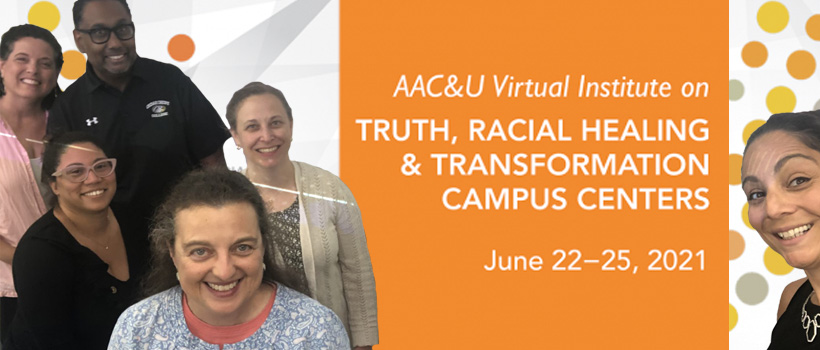
Cedar Crest College was one of more than 70 colleges and universities to participate in a virtual institute focused on promoting racial healing and addressing inequities on campuses. The College was selected via a competitive process to participate in the Institute on Truth, Racial Healing and Transformation (TRHT) held from June 22-25.
A team of Cedar Crest faculty, staff and administrators attended the virtual institute, hosted by the Association of American Colleges and Universities (AAC&U), to learn about the TRHT framework and develop an action plan. The College’s team included the following community members:
Tammy Bean, M.Ed., Director of Community Service (co-leader)
Erika Davis, Ed.D., Vice President of Enrollment Management and Marketing
Amy E. Faivre, Ph.D., Professor of Biology (co-leader)
Leon John, Ph.D., Executive Director of Diversity and Inclusion
Elizabeth Ortiz, MA, M.Ed., Assistant Professor of Communication
Wendy Robb, Ph.D., Dean of the School of Nursing
At the Institute, Cedar Crest’s team had the opportunity to meet with and learn from leaders at TRHT Campus Centers. An initiative of the AAC&U, TRHT Campus Centers aim to create equity on campuses and across the country and prepare campus leaders to further the TRHT effort. The Centers are guided by the TRHT framework, which is focused on narrative change, racial healing and relationship building, as well as an understanding of broader issues of systemic and structural racism. Currently, 30 institutions across the country host Campus Centers. More on the Institute and TRHT Campus Centers can be found at aacu.org.
Throughout the event, the Cedar Crest representatives participated in Rx Racial Healing® Circles, engaged in interactive sessions to learn how to conduct Healing Circles, strategized action plans for moving forward and learned from the 30 TRHT Centers. According to AACU.org, “Rx Racial Healing Circles, are meant to ground the various elements of the TRHT methodology in a compassionate and expansive forum for sharing personal truth to help begin the process of transforming hearts and minds.”
The team was inspired by the work campuses across the country have done to bring about more campus connectivity and find significant ways to create relationships with community partners. These institutions have begun to explore how racial inequities within their institutions have impacted their ability to interact fully with their external community.
Biology professor Amy Faivre, Ph.D., was a co-leader of Cedar Crest’s team. “I really appreciated having a chance to talk to and be inspired by others who have been doing racial healing work in a variety of ways and had so much energy, encouragement and fresh ideas,” she says. “I know we can do this work at Cedar Crest. [Attending] the Institute and meeting the other participants… helped me understand what a long and continuous process this needs to be, but also that we have a whole community to reach out to for help and advice.”
At the end of the Institute, the Cedar Crest team was charged with submitting a draft action plan for the College. The team’s goals included fostering greater connections and expanding mentorship opportunities among the Cedar Crest community, as well as continuing to review course content with diversity and inclusion in mind. The team will also explore funding options for the College to host its own TRHT Campus Center.
“The Institute was tremendously impactful,” says fellow team leader Tammy Bean, M.Ed., who leads the College’s Lutz Center for Community Service.
“Hearing from campuses that have implemented the TRHT framework… was inspiring for what CCC can do,” Bean concludes. “I believe that the Institute has provided the opportunity for the College to create a road map for where we can go using the TRHT framework. If we are able to follow the road map and expand on the work of the Institute, we can expand our services for our current and future students, faculty, staff, alumni and community members.”
Visit Center for Diversity & Inclusion to learn more about Cedar Crest’s ongoing diversity, equity and inclusion efforts.